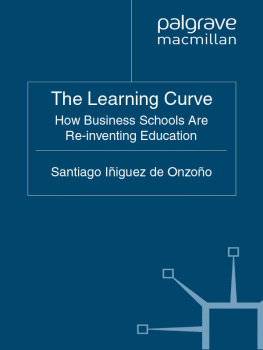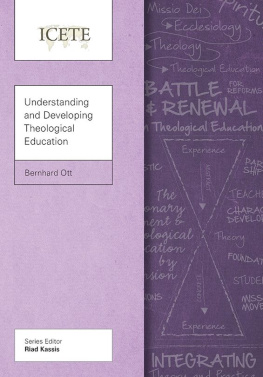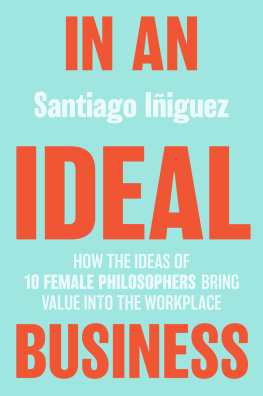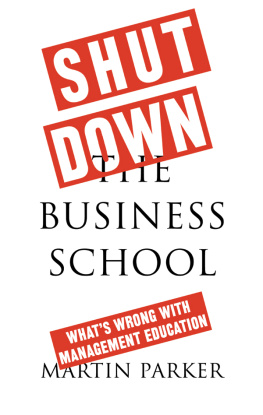A BOUT THE A UTHOR
Santiago Iiguez de Onzoo studied at Madrids Complutense University and Oxford University. He is a Doctor of Law and holds an MBA from IE Business School, where he has been Dean since 2004. He is also President of IE University since 2010.
Iiguez has spent 20 years working in higher education. He has worked as a management consultant and has played an active role in the field of quality control and the development of management education in Europe. He is a member of the boards of the EFMD (European Foundation for Management Development); the International Advisory Board of AMBA (Association of MBAs, UK); the European Advisory Council of AACSB International (Association to Advance Collegiate Schools of Business); and the Awarding Body of EQUIS (European Quality System). He is the Chairman of GFME (Global Foundation for Management Education), and he serves on the boards of CENTRUM (Universidad Catlica, Per); Antai Business School (Jiao Tong University, China); and Renmin University Business School (China). He has been described by the Financial Times as: One of the most significant figures in promoting European business schools internationally. Iiguez is also President of the IE Fund in the United States.
Iiguez is co-editor of a blog focused on management education (www. deanstalk. net). He has published a number of articles and case studies on business management and is the author and co-author of articles on moral philosophy and management education. As a professor of strategic management and expert in management education, Iiguez regularly speaks at international conferences and frequently contributes to journals and media worldwide.
A CKNOWLEDGMENTS
Given the short span of human lives for learning, for achievement, and for joy, many people would like to live at least two lives. Those of us who work in education can say that we live twice: we live our own lives; and we live out the dreams of the students with whom we have worked and whom we have known, and whose development we have contributed to.
I consider myself enormously fortunate to have been able to dedicate my life to teaching, a vocation I identified with while still very young, when I would give classes to my uncomplaining younger siblings; its a passion that has only increased over the years.
Academic life is tremendously satisfying, but also demanding, as well as highly competitive. After completing my MBA at the IE Business School some 20 years ago, I was lucky enough to receive an offer to work there. My circle of good fortune was completed when I began working alongside Diego del Alczar Silvela, the Founder and President of IE Business School. He has been my teacher, mentor, and personal and professional reference for the past 17 years. It is to him that I would like to offer my thanks first: he is the intellectual and spiritual source of inspiration for this book. His strategic vision and energy have made the IE Business School what it is today: a business school known and respected around the world for its achievements in business research and teaching. Diego has shown us new ways to dream.
As head of external relations, and then as Dean of the IE Business School, I have been privileged to work with the impressive team of professionals who comprise the board of directors at IE. I would like to thank Javier Solano, whose work as Financial Vice-President of IE allows me to sleep at nights. I would also like to thank Alfonso Martnez de Irujo, Gonzalo Garland, Rafael Puyol, Margarita Alonso, Celia de Anca, Miguel Sags, and Salvador Aragn. I owe a debt of gratitude for their support, their ideas, and for putting up with me during our weekly meetings. In memory of absent friends, I would like to remember Jos Mario lvarez de Novales, who was also a member of the board, and the stamp of whose intellect and energy remains both on the institution and on those of us who worked with him.
As Dean, I have been privileged to walk on the shoulders of giants, specifically those of my close collaborators. I can count on the support of an unparalleled talented team, whose job is to implement our mission in education. I learn something new from them every day, and have discussed with them many of the ideas and proposals outlined in this book: Salvador Carmona; David Bach; Joaqun Garralda; Jos Mara de Areilza; Manuel Fernndez de Villalta; Arantza de Areilza; Adriana Angel; Luis Sols; Marco Trombetta; Samuel Martn Barbero; Martha Thorne; Javier Quiintana; Antonio de Castro; and Antonio Montes. I am very proud to work with them, and cannot thank them enough for their professionalism and friendship.
Over the years, I have taken part in myriad initiatives and projects aimed at developing management education and business schools around the world. I have benefitted from the exchange of ideas in conferences and meetings with other deans, teachers, business leaders, opinion makers, and the heads of a wide range of institutions, but I would particularly like to thank, in alphabetical order, Gabriela Alvarado, Paz Alvarez, Kofi Appenteng, Richard Barker, Fernando Barnuevo, Fernando Bartolom, Jernimo Betegn, George Bickerstaffe, Xiang Bing, Frank Brown, John A. Byrne, Jordi Canals, Federico Castellanos, Bernadette Conraths, Eric Cornuel, Sue Cox, Rolf Cremer, Carlos Cruz, Enrique Dans, Fernando DAlessio, Emerson de Almeida, Teppo Felin, John Fernandes, Ernesto Gore, Mauro Guilln, Maria Lorena Gutirrez, William Haseltine, Louis Lavelle, Dan Le Clair, Peter Lorange, Xiongwen Lu, Colin Mayer, Carmelo Mazza, Francesco Mazzuca, Arnoud de Meyer, David Parcerisas, Kai Peters, Jeanette Purcell, Nunzio Quacquarelli, Paolo Quattrone, Michael Osbaldeston, Robert Owen, Bernard Ramanantsoa, Carlos Ramos, Quique Rodrguez, Juan Santal, Alfons Sauquet, Gordon Shenton, Blair Sheppard, Cristina Simn, Jonathan Slack, Ted Snyder, Matt Symonds, Pierre Tapie, Howard Thomas, Marianne Toldalagi, Margaret Touborg, Julio Urgel, Arpad Von Lazar, Zhong-Ming Wang, Blake Winschell, Matthew Wood, Zhihong Yi, and Lin Zhou.
Six years ago, Paul Danos, Della Bradshaw, and myself created Deanstalk, a management education blog, which has turned out to be an important forum for discussing ideas about business education. I am grateful to both of them for participating in an experience that was then disruptive and uncertain. Many of the ideas outlined in this book have been developed and tested in the blog, and I have benefitted enormously from the exchange with those who read and commented on it. I have also been lucky enough to continue working with Paul Danos through the countless Deans Roundtables he has organized around the world with the goal of sharing best practices in business schools. These roundtables have given me a deeper, wider vision of management education, as well as allowing me to form a lasting friendship with Paul, with whom I shall continue to organize workshops in the future.
During the past years, I have counted on the continuous support of Bryan OLoughlin, an invaluable administrative and academic collaborator, and I would like to thank him for going the extra-mile on many occasions and helping in molding and shaping my ideas, including with this book.
I feel particularly indebted to the members of the Communication team at IE, led by Jose Flix Valdivieso. They have assisted me over the years in identifying and refining the ideas and messages conveyed in my public addresses. Many thanks to Maite Brualla, Igor Galo, Geoffroy Gerard, Yolanda Regodn, Juncal Snchez Mendieta, Kerry Parke, and Vernica Urbiola. Let me also mention Marip Menndez, Ulla Karpinnen, and Michael Aldous, who preceded them in said department.
I would also like to offer a special thanks to Des Dearlove and Stuart Crainer for their support in editing this book, as well as their proposals for ways to make the ideas outlined in the book more accessible to a wider public. I would also like to thank Palgrave Macmillans Stephen Rutt for his support in bringing to fruition the original idea of this book, and for his constant encouragement. Let me also thank Eleanor Davey-Corrigan and Vidhya Jayaprakash for their assistance during the editorial process.
Next page





